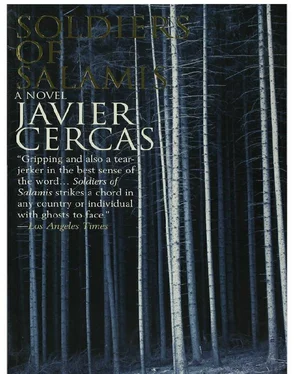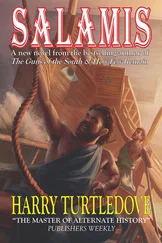So in 1929, back in Madrid, Sánchez Mazas had already made the decision to dedicate himself entirely to ensuring that such a time would also return to Spain. Up to a point he succeeded. War is the time of heroes and poets par excellence, and in the thirties few people pledged as much intelligence, as much effort and as much talent as he did to making war break out in Spain. Upon his return to the country, Sánchez Mazas understood straightaway that to achieve his goal it was not only necessary to found a party cut from the same cloth as the one he'd watched triumph in Italy, but also to find a Renaissance condottiere, a figure who, when the time came, would symbolically catalyze all the forces liberated by the panic the decomposition of the monarchy and the inevitable triumph of the Republic would generate among the most traditional sectors of Spanish society. The first venture took a while yet to come off; but not the second, for José Antonio Primo de Rivera immediately came to embody the figure of providential caudillo Sánchez Mazas was looking for. The friendship that united them was solid and durable (so much so that one of the last letters José Antonio wrote from Alicante prison on the eve of his execution on 20 November 1936 was to Sánchez Mazas); perhaps this was because it was based on an equitable division of roles. José Antonio in fact possessed all that Sánchez Mazas lacked: youth, beauty, physical courage, money and lineage; the opposite was also true: armed with his Italian experience, his extensive reading and literary talent, Sánchez Mazas became José Antonio's most trusted advisor and, once the Falange was founded, its principal ideologue and propagandist and one of the fundamental forgers of its rhetoric and symbols. Sánchez Mazas proposed the party symbol of yoke and arrows, which had been the symbol of the Catholic Monarchs, coined the ritual slogan, 'Arise Spain!', composed the very famous Prayer for the Falangist Dead, and over the course of several December nights in 1935 participated, along with José Antonio and other writers of his circle — Jacinto Miquelarena, Agustin de Foxa, Pedro Mourlane Michelena, José Maria Alfaro y Dionisio Ridruejo — in the writing of the lyrics to the anthem Face to the Sun, on the ground floor of Or Kompon, a Basque bar located on Miguel Moya Street in Madrid.
But it would still take some time before Sánchez Mazas was to become the Falange's principal purveyor of rhetoric, as Ramiro Ledesma Ramos called him. When he arrived in Madrid in 1929, surrounded by an aura of prestige as a cosmopolitan writer with brand new ideas, no one in Spain was thinking seriously of founding a party in the fascist mould, not even Ledesma, who a couple of years later would found the JONS, the first Spanish fascist faction. Like life in general, however, literary life was becoming more radical by the minute, heated by the convulsions shaking Europe and the changes that could be glimpsed on the horizon of Spanish politics: in 1927 a young writer called Cesar Arconada, who had subscribed to the elitism of Ortega y Gasset and before long would be swelling the ranks of the Communist Party, summed up the feelings of many people of his age when he declared that 'a young man can be a Communist, a fascist, anything at all, anything as long as he doesn't cling to old liberal ideas'. That explained, in part, why so many writers of the moment, in Spain and all over Europe, changed in so few years from the playful, sporty aestheticism of the roaring twenties to the pure, hard political combat of the ferocious thirties.
Sánchez Mazas was no exception. In fact, the entirety of his pre-war literary activity consists of innumerable articles of hardened prose, where the moral and aesthetic definition of the Falangists — made up of deliberate ideological confusion, mystical exaltation of violence and militarism, and essentialist vulgarities proclaiming the eternal character of the fatherland and the Catholic religion — coexists with a central proposition which, as Andrés Trapiello points out, was basically limited to stocking up on quotes from Latin historians, German thinkers and French poets that would serve to justify the approaching fratricidal assault. Sánchez Mazas' political activity, on the other hand, was frenetic during these years. In February 1933, having taken part in various attempts to create a fascist party, along with the journalist Manuel Delgado Barreto, José Antonio Primo de Rivera, Ilamiro Ledesma Ramos, Juan Aparicio and Ernesto Gimenez Caballero — with whom for years he carried on a not always buried struggle for the ideological leadership of Spanish fascism, which he eventually won — Sánchez Mazas founded the weekly El fascio, which amounted to the first encounter of the various national-syndicalist tendencies which would eventually come together in the Falange. The first and only issue of Elfascio appeared a month later and was immediately banned by the authorities, but on 29 October of that year the founding act of the Spanish Falange took place in the Madrid Drama Theatre, and Sánchez Mazas, who months later would be assigned party membership card number four (Ledesma had number one; José Antonio two; Ruiz de Alda three; Gimenez Caballero five), was named to its Executive Council. From that moment and until 18 July 1936 his influence in the party — a party that before the war never managed to attract more than a hundred members in the entire country, and that never reaped more than a few thousand votes in all the elections for which it stood, but that would be decisive for the future history of the country — was fundamental. During those obdurate years Sánchez Mazas gave speeches, spoke at meetings, designed strategies and programmes, wrote reports, made up slogans, advised his leader and, especially by way of F.E., the official weekly publication of the Falange — where he was in charge of a section called 'Watchwords and Standards of Style' —disseminated, in anonymous articles and others signed by him or by José Antonio himself, ideas and a way of life which, in time and as no one could have suspected — least of all Sánchez Mazas — would eventually become the way of life and ideas, adopted as a revolutionary shock ideology in the face of the urgencies of the war, later lowered to the status of ideological ornament by the chubby, blustering, effeminate, incompetent, astute and conservative soldier who usurped them, finally becoming the increasingly rotten and mean ingless paraphernalia with which a handful of boors struggled for forty gloomy years to justify their shitty regime.
However, during the time the war was incubating, the watchwords Sánchez Mazas disseminated still possessed a gleaming suggestion of modernity, that young patriots from good families and the violent ideals they cherished contributed to strengthening. At that time José Antonio was very fond of quoting a phrase of Oswald Spengler's; that at the eleventh hour it had always been a squad of soldiers that had saved civilization. At that time the young Falangists felt they were that squad of soldiers. They knew (or believed they knew) that their families slept an innocent sleep of bourgeois beatitude, not knowing that a wave of impunity and egalitarian barbarism was going to wake them suddenly with a tremendous clamour of catastrophe. They felt their duty was to preserve civilization by force and avoid the catastrophe. They knew (or believed they knew) that they were few, but this mere statistical circumstance did not daunt them. They felt they were heroes. Although he was no longer young and lacked the physical strength, courage and even the essential conviction to be one — but not a family whose innocent sleep of bourgeois beatitude he wished to preserve — Sánchez Mazas also felt it, and thus abandoned literature to give himself over to the cause with priestly devotion. That didn't keep him from frequenting the most exclusive salons of the capital with José Antonio, or from joining him in some of his notorious, seigneurial escapades, like the Charlemagne Dinner Parties, extravagantly sumptuous banquets held in the Hotel París to commemorate the Emperor; but especially to protest with their rigorous aristocratic exquisiteness against the democratic and republican vulgarity lying in wait on the other side of the hotel's walls. The most assiduous meetings of José Antonio and his constant entourage of poet soldiers took place downstairs at the Café Lyon, on Alcalá Street, in a place known as La Ballena Alegre, where they would argue heatedly, until the small hours, about politics and literature, and where they coexisted in an atmosphere of false cordiality with young left-wing writers with whom they shared anxieties and beer, conversations, jokes and polite insults.
Читать дальше












